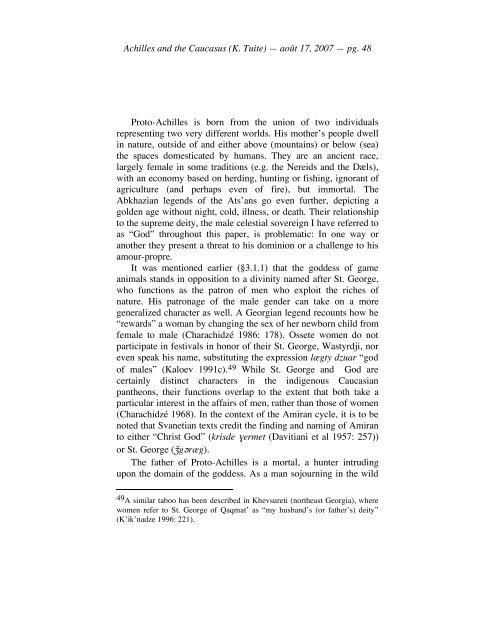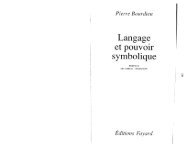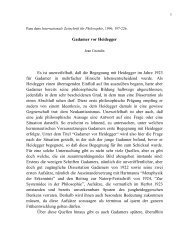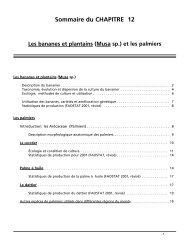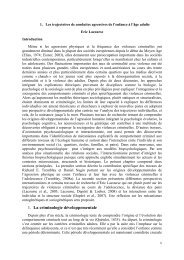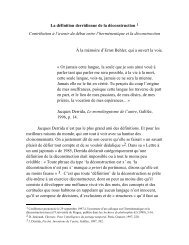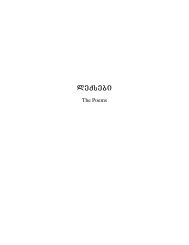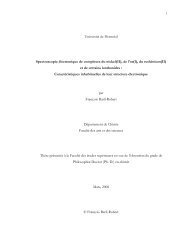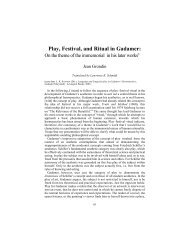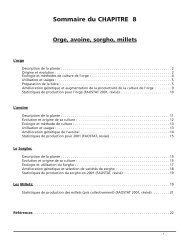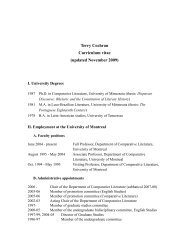Achilles and the Caucasus - Université de Montréal
Achilles and the Caucasus - Université de Montréal
Achilles and the Caucasus - Université de Montréal
Create successful ePaper yourself
Turn your PDF publications into a flip-book with our unique Google optimized e-Paper software.
<strong>Achilles</strong> <strong>and</strong> <strong>the</strong> <strong>Caucasus</strong> (K. Tuite) — août 17, 2007 — pg. 48<br />
Proto-<strong>Achilles</strong> is born from <strong>the</strong> union of two individuals<br />
representing two very different worlds. His mo<strong>the</strong>r’s people dwell<br />
in nature, outsi<strong>de</strong> of <strong>and</strong> ei<strong>the</strong>r above (mountains) or below (sea)<br />
<strong>the</strong> spaces domesticated by humans. They are an ancient race,<br />
largely female in some traditions (e.g. <strong>the</strong> Nereids <strong>and</strong> <strong>the</strong> Dæls),<br />
with an economy based on herding, hunting or fishing, ignorant of<br />
agriculture (<strong>and</strong> perhaps even of fire), but immortal. The<br />
Abkhazian legends of <strong>the</strong> Ats’ans go even fur<strong>the</strong>r, <strong>de</strong>picting a<br />
gol<strong>de</strong>n age without night, cold, illness, or <strong>de</strong>ath. Their relationship<br />
to <strong>the</strong> supreme <strong>de</strong>ity, <strong>the</strong> male celestial sovereign I have referred to<br />
as “God” throughout this paper, is problematic: In one way or<br />
ano<strong>the</strong>r <strong>the</strong>y present a threat to his dominion or a challenge to his<br />
amour-propre.<br />
It was mentioned earlier (§3.1.1) that <strong>the</strong> god<strong>de</strong>ss of game<br />
animals st<strong>and</strong>s in opposition to a divinity named after St. George,<br />
who functions as <strong>the</strong> patron of men who exploit <strong>the</strong> riches of<br />
nature. His patronage of <strong>the</strong> male gen<strong>de</strong>r can take on a more<br />
generalized character as well. A Georgian legend recounts how he<br />
“rewards” a woman by changing <strong>the</strong> sex of her newborn child from<br />
female to male (Charachidzé 1986: 178). Ossete women do not<br />
participate in festivals in honor of <strong>the</strong>ir St. George, Wastyrdji, nor<br />
even speak his name, substituting <strong>the</strong> expression lægty dzuar “god<br />
of males” (Kaloev 1991c). 49 While St. George <strong>and</strong> God are<br />
certainly distinct characters in <strong>the</strong> indigenous Caucasian<br />
pan<strong>the</strong>ons, <strong>the</strong>ir functions overlap to <strong>the</strong> extent that both take a<br />
particular interest in <strong>the</strong> affairs of men, ra<strong>the</strong>r than those of women<br />
(Charachidzé 1968). In <strong>the</strong> context of <strong>the</strong> Amiran cycle, it is to be<br />
noted that Svanetian texts credit <strong>the</strong> finding <strong>and</strong> naming of Amiran<br />
to ei<strong>the</strong>r “Christ God” (kris<strong>de</strong> ƒermet (Davitiani et al 1957: 257))<br />
or St. George (Z&g´ræg).<br />
The fa<strong>the</strong>r of Proto-<strong>Achilles</strong> is a mortal, a hunter intruding<br />
upon <strong>the</strong> domain of <strong>the</strong> god<strong>de</strong>ss. As a man sojourning in <strong>the</strong> wild<br />
49 A similar taboo has been <strong>de</strong>scribed in Khevsureti (nor<strong>the</strong>ast Georgia), where<br />
women refer to St. George of Qaqmat’ as “my husb<strong>and</strong>’s (or fa<strong>the</strong>r’s) <strong>de</strong>ity”<br />
(K’ik’nadze 1996: 221).


